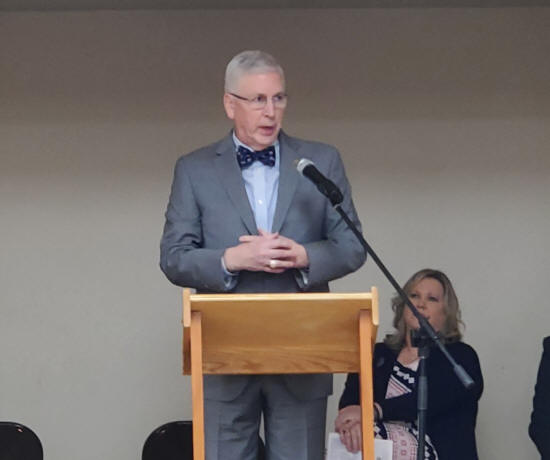|
One of the newer special days of recognition is
for Vietnam veterans. The National Vietnam War Veterans Day Ceremony
held in Lincoln on March 29.

 The keynote speaker was retired United States Marine Corps Colonel
Robert Tyler. The keynote speaker was retired United States Marine Corps Colonel
Robert Tyler.
Tyler served in Vietnam flying with the “Flying Tigers.” The Marine
Medium Helicopter Squadron 262 operated out of Marble Mountain near
Danang in the region known as I Corps.
Tyler gave a history of dates that jump out at him:
-
In
1956, Soviet Premier Nikita Khrushchev said to the U.S, “We will
bury you.”
-
In
1961 was the Bay of Pigs and Cuban Missile Crisis.
-
In
1965, ground troops went into Vietnam.
-
In
1968 was the Tet Offensive [U.S.
Involvement in the Vietnam War: The Tet Offensive, 1968] and
Tyler was learning to be an aviation electrician.
-
In
1969, when Woodstock occurred, Tyler was on the rifle range.
In July 1969, when man landed on the moon, Tyler
was checking into flight school. When Tyler watched Apollo 13, years
later, he realized he barely remembered the moon landing. Tyler was
doing jungle survival.
As a helicopter pilot, Tyler said he had a different perspective of
the war than most. The Vietnam countryside was gorgeous with pretty
hills, nice valleys, wonderful mountains, and nice shores with sandy
beaches.
Flying the medivac, Tyler could see what was happening down below.
He hauled people out of the jungle. He flew chaplains, dentists and
doctors to villages to take care of the people there. There was a
baby born in the emergency medivac when he was called to help a
woman having a difficult pregnancy.
The other half of Tyler’s office in Danang was shared with the First
Wing Public Affairs Officer. He recalled that this officer would say
that if a briefing went out and there were no topics besides county
fairs, babies being born or a marine died saving someone else, no
one showed up for these briefings. On the other hand, if there was a
friendly fire incident, the place would be packed.

As the war was winding down, there was a Congressional Delegation
Tyler was fortunate to attend in Khe Sanh, Vietnam. There they saw
mass graves and the destruction of villages. Tyler said four years
later, he finally found a report about it in the Honolulu Star.
People back in the United States did not know what was really
happening over in Vietnam. Many stories of what was happening over
there did not make the news.
For example, the first month Tyler was in Vietnam,
he was secure in the Marble Mountains. Soon, their huts started
getting rocketed. [There were] 186 medivacs went out in one day, but
Tyler said that never hit the news.
Over the years, Tyler said the media and Hollywood has often
characterized veterans as disturbed, homeless, druggies and victims.
[to top of second column] |

Tyler has never considered himself a victim. He felt
it was an honor and privilege to serve as an officer in the Marines.
Now Tyler teaches psychology classes at Richland Community College.
When talking to students about Post Traumatic Stress, he does not
call it PTSD. Adding the “D” means it is a disorder and Tyler said
that indicates he is defective. PTS means he has stress and maybe an
injury, but an injury can be fixed.
In his classes, Tyler tells students about an article where a
Sergeant General talks about his coffee cup having all kinds of crud
in it. However, every day, the man said he puts coffee and possibly
cream in the cup even with its residue.
Using the coffee cup analogy, Tyler said many veterans have residue.
Many who have been in war came home to become normal and responsible
citizens. They are not defective. Tyler knows many normal vets. He
knows some who have become architects, engineers, school principals
and even senators. Tyler asked why they should feel like victims for
having served.

In transitioning out of Vietnam, Tyler missed a lot of the animosity
many experienced. He brought his squadron out of the country to
Hawaii and they settled in quietly. Tyler’s son has been deployed
four times and Tyler has ensured he did not get treated or
remembered the same way as the Vietnam Veterans.
Society has changed in how they deal with things, even in their own
aircraft. Tyler said when someone died enroute to the hospital on
emergency medivac flights, he just reported it. When Tyler’s son was
flying medivac Blackhawks and someone died enroute, it became a hero
flight.
There are 58,220 names on the Vietnam War Memorial Wall. Though
Tyler appreciates the Wall, he said it has taken away from those
named - their [rank] service, and their [branch] organization.
These soldiers are not [listed as] seamen, airmen, marines,
soldiers, sergeants, gunnies, or lieutenants. On the wall, these
soldiers become just a name. The Wall does not say to the people who
visit it that these were American men and women who stood up and
were part of the seven percent of Americans who have ever worn a
uniform.
Tyler is glad the Wall is there. However, he wishes it listed their
units, organizations, and the fact that they were American service
members and not just veterans.
One question Tyler said always comes up is whether they made a
difference. He said many who got out of Vietnam after 1975 and now
work in various jobs in the United States are glad the service
members were there. Every Veterans Day, Tyler receives a thank you
card from someone whose family lived in Vietnam during the war.
National Vietnam War Veterans Day is about recognizing these
veterans for what they did. Tyler said those willing to go and fight
deserve thanks for their service. He reminded the Vietnam Veterans
to remember they answered the call and wear the pin with pride.
[Angela Reiners]
Editor’s note: Due to
privacy issues, veterans names who were honored were not made
available. |